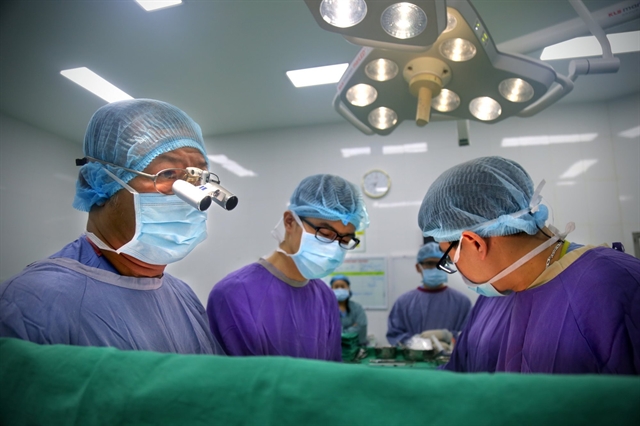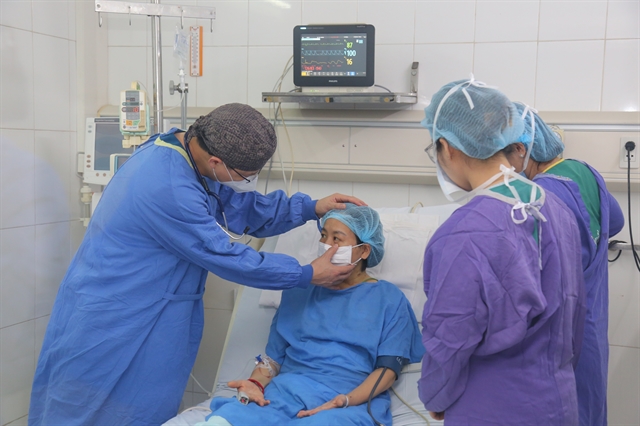 Opinion
Opinion

 |
| A medical team performs a donor kidney transplant at HCM City's Chợ Rẫy Hospital. VNA/VNS Photo |
HÀ NỘI — The cost of organ transplants currently exceeds the financial capacity of many patients' families, particularly those who are economically disadvantaged. To solve this problem, medical experts are suggesting that health insurance policies cover more expenses to increase access to organ transplant procedures and extend patients' lives.
Organ transplants require substantial funds, even though the cost of performing a transplant in Việt Nam is among the lowest in the world.
According to Đinh Văn Lượng, Director of the National Lung Hospital, the first lung transplant at the hospital cost VNĐ1.3 billion (US$51,096) and the second cost VNĐ1.1 billion ($43,235).
These amounts were beyond what the patients' families could afford, so the hospital had to provide nearly VNĐ1 billion in financial support to perform these transplants.
The situation is similar for liver transplants. Associate Professor Lê Văn Thành, Director of the Institute of Digestive Surgery and Head of the Department of Hepato-Pancreato-Biliary Surgery at the 108 Military Central Hospital, stated that the total cost of a liver transplant is about VNĐ1 billion ($39,300).
Health insurance covers only about VNĐ200 million ($7,860) for patients eligible for 100 per cent coverage. For those not fully covered, insurance only pays VNĐ163 million ($6,400). This leaves a wide gap between current insurance coverage and the cost of a liver transplant.
In addition to the costs of transplanting organs, there are related expenses including for resuscitation activities, brain death diagnosis, organ retrieval, preservation, coordination and transportation. These costs have not been uniformly regulated in Việt Nam, making it difficult for hospitals to settle payments, especially those performing organ donations.
For example, the Việt Nam-Sweden Hospital in Quảng Ninh Province provides consultation, resuscitation and brain death diagnosis, but organs are transferred to other hospitals for transplants.
Meanwhile there are still no mechanisms or policies in place in Việt Nam for consulting on organ donation from brain-dead or heart-dead individuals.
Given the reality that many patients in need of transplants face financial difficulties, numerous experts have proposed increased coverage from the health insurance fund and other social sources.
Associate Professor Đồng Văn Hệ, Director of the National Coordinating Centre for Human Organ Transplantation, emphasised the necessity of establishing organ donation advisory teams at hospitals. Over time, the costs for transplant patients and immunosuppressive medications will be cheaper than dialysis.
"To further develop and sustain the field of organ transplantation, it is essential to establish advisory teams at hospitals with potential brain-dead donors and to set up funding for consultation and coordination activities," Hệ said.
 |
| Doctors from the Anesthesia and Resuscitation Centre at Việt Nam-Germany Hospital examine a patient after a liver transplant. VNA/VNS Photo |
Dr. Nguyễn Thanh Xuân from Huế Central Hospital proposed developing a structured pricing system for organ transplants as a basis for health insurance reimbursement, to be applied uniformly across all medical facilities nationwide.
He also suggested establishing a humanitarian support fund to assist patients and donors, reducing the financial burden on medical institutions performing organ retrieval and transplantation. This includes full reimbursement for organ retrieval, a post-donation health car and periodic health checks at the donation facility or a convenient location for the donor.
Xuân also recommended policies to honour living donors, providing them with lifetime health insurance that offers prioritised and fully covered healthcare at any suitable medical facility. Additional specific benefits and rewards should be included.
Furthermore, he proposed creating a payment mechanism for the treatment and resuscitation of brain-dead donors, evaluating organ function, organ retrieval surgery and transportation costs.
Xuân also suggested establishing funds and payment mechanisms related to brain-dead donors, such as funeral and burial expenses.
Immediate family members such as parents, spouses and children of deceased donors should receive lifetime free health insurance with maximum coverage and priority for organ transplants if they need one.
A support fund should be set up to cover the education and upbringing of the donor’s children until they reach 18 years of age, he said.
Professor Trần Văn Thuấn, Deputy Minister of Health, stated that Việt Nam has achieved many milestones in organ transplantation, leading Southeast Asia in the number of transplants performed each year with technology on par with the rest of the world.
According to the National Coordinating Centre for Human Organ Transplantation, living donors still constitute 95 per cent of donors in Việt Nam, whereas in developed countries like Spain and South Korea, over 50 per cent of donations come from brain-dead individuals.
However, the number of donated organs only meets a small fraction of the actual demand. This shortfall is partly due to cultural beliefs that the body should remain intact after death and a lack of awareness about organ transplantation in the community.
Additionally, the promotion of organ donation has not been fully developed or optimised and coordination among hospitals and relevant agencies remains inadequate. Currently, only 23 central hospitals have organ donation advisory teams, but few of these teams are actively functioning and there is no support mechanism for these advisory teams. — VNS




